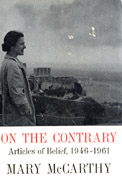
BOOKS & WRITERS
II II
Burroughs’ "Naked Lunch'
By Mary McCarthy
LAST summer at the International Writers’
Conference in Edinburgh, I said I thought
the national novel, like the nation-state, was
dying and that a new kind of novel, based on
statelessness, was beginning to be written. This
novel had a high, aerial point of view and a
plot of perpetual motion. Two experiences, that
of exile and that of jet-propelled mass tourism,
provided the subject matter for a new kind of
story. There is no novel, yet, that I know of,
about mass tourism, but somebody will certainly
write it. Of the novel based on statelessness, I
gave as examples William Burroughs’ The
Naked Lunch, Vladimir Nabokov’s Pale Fire
and Lolita. Burroughs, I explained, is not
literally a political exile, but the drug addicts
he describes are continually on the move, and
life in the United States, with its present narcotics
laws, is untenable for the addict if he does
not want to spend it in jail (in the same way,
the confirmed homosexual is a chronic refugee,
ordered to move on by the Venetian police, the
Capri police, the mayor of Provincetown, the
mayor of Nantucket). Had I read it at the time,
I might have added Gunter Grass’ The Tin
Drum to the list: here the point of view, instead
of being high, is very low, that of a dwarf; the
hero and narrator is a displaced person, born in
the Free City of Danzig, of a Polish mother
(who is not really a Pole but a member of
minority within Poland) and an uncertain father,
who may be a German grocer or a Polish postal
employee. In any case, I said that in thinking
over the novels of the last few years, I was
struck by the fact that the only ones that had
not simply given me pleasure but interested me
had been those of Burroughs and Nabokov. The
others, even when well done (Compton-Burnett),
seemed almost regional.
This statement, to judge by the British press,
was a shot fired round the world. I still hear
its reverberations in Paris and read about them
in the American press. I am quoted as saying
that The Naked Lunch is the most important
novel of the age, of the epoch, of the century.
The only truthful report of what I said about
Burroughs was given by Stephen Spender.
But nobody seems to have
paid attention to Spender any more than anyone
paid attention to what I said on the spot. WhenI
chided one reporter, Malcolm Muggeridge, in
person with having terribly misquoted me in
the New Statesman, he appeared to think that
there was not much difference between saying
that a book was one of two or three that had
interested you in the last few years and saying
that it was one of the "outstanding novels of the
age." According to me, the age is still Proust,
Joyce, Kafka, Lawrence, Faulkner, to mention
only the "big names," but to others evidently
the age is shrinking to the length of a publishing
season, just as a literary speaker is turned
into a publisher’s tout. The result, of course,
is a disparagement of Burroughs, because if
The Naked Lunch is proclaimed as the masterpiece
of the century, then it is easily found
wanting. Indeed, I wonder whether the inflation
of my remarks was not at bottom malicious;
it is not usually those who admire Burroughs
who come up to me at parties to announce: "I
read what you said at Edinburgh." This is true,
I think, of all such publicity; it is malicious in
effect whatever the intention and permits the
reader to dismiss works of art and public figures
as "not what they are cracked up to be." A
similar thing happened with Dr. Zhivago, a
wonderful book, which attracted much hatred
and venom because it was not Tolstoy. Very
few critics said it was Tolstoyan, but the impression
got around that they had. Actually, as I
recall, the critics who mentioned Tolstoy in
connection with Pasternak were those bent on
destroying Pasternak’s book.
As for me, I was left in an uncomfortable
situation. I did not want to write in to the
editors of British newspapers and magazines,
denying that I had said whatever incontinent
thing they had quoted me as saying. This would
have been ungracious to Burroughs, who was
the innocent party in the affair and who must
have felt more and more like the groom in a
shotgun literary wedding, seeing my name
yoked with his as it were indissolubly.
No comments:
Post a Comment